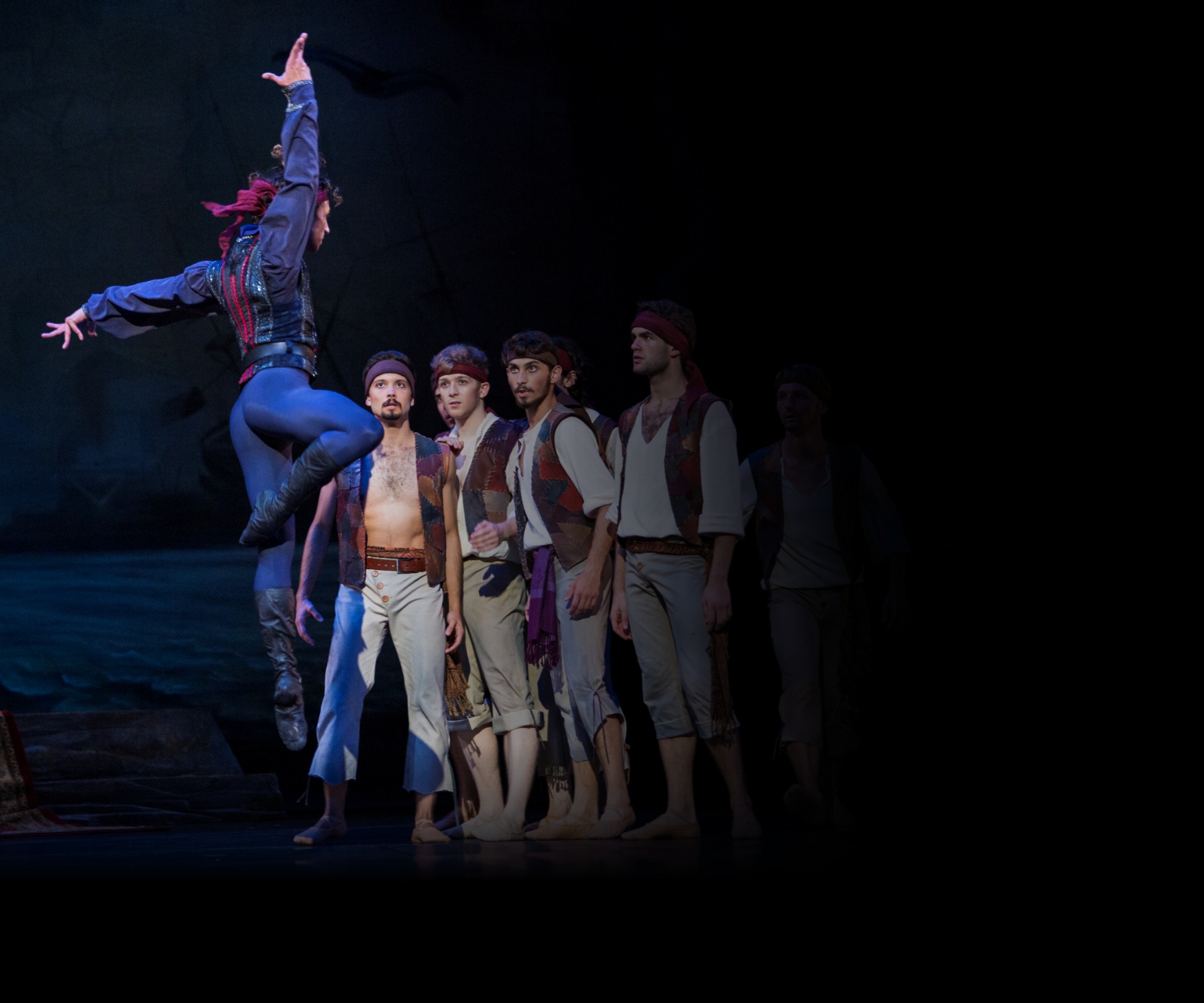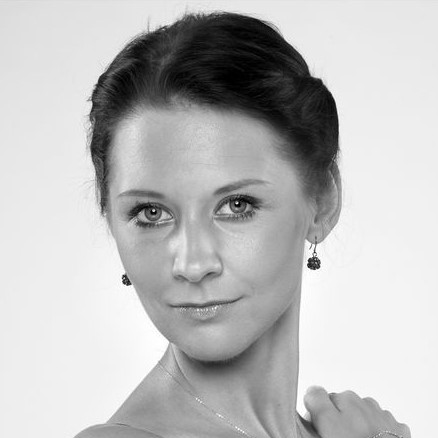-
PROLOGUE
On the shore
At the end of a successful raiding voyage, Conrad, accompanied by his second-in-command Birbanto and his buccaneers, returns to land. Lanquedem, the bazaar owner, is also scouting the shore with his henchmen, on the lookout for new female slaves. He knows that imprudent young women from the neighbouring enemy village come to walk here. Indeed, scarcely have the men settled down on the lookout when the unsuspecting women appear, led by the noblewomen Médora and Gulnare. They are quickly surrounded and overpowered by the men. As a connoisseur in these matters, Lanquedem chooses Médora and Gulnare and does not concern himself with the other women. The two beauties are taken off to the bazaar, closely guarded.
-
Act I
The bazaar
People are going about their business between the colourful stalls when Lanquedem and his two captives arrive. Lanquedem is impressed by the extraordinary beauty of Gulnare and gives her into the care of his female servant, who is to prepare her for presentation. Médora is sent off to join the other slaves. Then there are new arrivals at the market: Conrad, Birbanto and the buccaneers. Zulméa, the daughter of a rich merchant, immediately starts making eyes at Birbanto. Lanquedem calls to Conrad and proposes that he have a look at his slave girls. Conrad does not find them very interesting, and so Lanquedem has Médora brought in. It is love at first sight on both sides! Lanquedem sees that he has found an interested customer. He has the beautiful young woman led off and tells Conrad that he can have Médora – but for a price. Conrad is willing to pay any price and wants to conclude the transaction immediately, but at that moment Seyd Pasha enters. This causes Lanquedem to stop and reflect, for Seyd Pasha could be a better buyer. He hands Médora over to his female servant.
Lanquedem welcomes Seyd Pasha with a great show of respect and – since he knows his weaknesses – shows him his female slaves. As Seyd Pasha does not show much enthusiasm, Lanquedem has Gulnare brought in, and Seyd Pasha immediately succumbs to her charms. Unable to resist such temptation, he is persuaded and buys her. Seyd Pasha is ready to depart, but Lanquedem persuades him to grant him a few moments more: Médora, adorned to show off her beauty to the utmost, is brought in. She is forced to dance before Seyd Pasha, but displays all her charms for Conrad, paying no heed to the Pasha, who hastens to make Lanquedem an offer. While the two men start haggling, Conrad tells Médora he loves her. But she is extremely anxious about the transaction of which she is the subject. Conrad assures her that she will leave this place with him and with no one else. But before Conrad has time to take action, the deal is concluded and Seyd Pasha departs with his two new slave girls – Gulnare and Médora. Conrad, who is hell-bent on winning the lady of his heart for himself, orders his men to wait in readiness. He sets off on the search for Médora. The buccaneers, who have total confidence in the capability of their leader, start a boisterous dance, but this is soon interrupted by the return of Conrad, who has found Médora. A shot rings out – this is Conrad’s signal to depart. Birbanto sees to it that the buccaneers capture Lanquedem and the slaves. Zulméa comes too, and they all make their escape.
-
Act II
The buccaneers’ stronghold
The buccaneers’ stronghold is filled with all the riches that the buccaneers have collected in the course of their raids. Their women are awaiting the return of their consorts. Conrad and Médora arrive. The women welcome them warmly and ask what has happened to their men. Conrad assures them that they are already on their way. Médora and Conrad have their first few minutes alone. Médora asks Conrad for a few moments by herself. Shortly afterwards the others return. The slaves and Lanquedem are excluded while the men and women celebrate seeing each other again. They are soon joined by Médora and Conrad.
Conrad presents his new love to them all, and Médora, who wants to make good use of this favourable moment, asks him to release all the slaves. Conrad orders Birbanto to grant her wish. Birbanto protests – why should they give up the slaves? But Médora’s wishes win the day. Conrad yields to her and orders the immediate release of the slaves. Birbanto is furious but obeys. However, he swears to get his revenge. Lanquedem, who has witnessed the scene, approaches Birbanto and offers to help him. Birbanto listens to the merchant and releases him from his bonds. Lanquedem gives him a strong sleeping potion concealed in a rose, which will put anyone who smells the flower into a deep sleep. Birbanto finds a perfect and devoted ally in Zulméa. He, therefore, asks her to bring the flower to Médora, who will surely give it to her lover.
As soon as Conrad and Médora return, they give free rein to their feelings for one another, until Zulméa appears with the poisoned flower. In an ecstasy of love and as a symbol of their first meeting, Médora does indeed give the rose to her beloved. Conrad, moved by her gesture, breathes deeply of the flower’s scent and immediately begins to stumble about and then lapses into a deep sleep. Médora is deeply shocked and tries to minister to him, while Birbanto and the masked buccaneers storm in. Feeling herself threatened, Médora grasps a dagger and wounds one of them, who turns out to be Birbanto. This unforeseen incident confuses the buccaneers and in particular Birbanto, who panics: Conrad is beginning to wake up! Since there is no time to be lost, Birbanto urges Lanquedem to flee as quickly as possible and to bring Médora with him.
-
Act III
The palace of Seyd Pasha
The setting is all luxury and voluptuousness. The women of the harem and Gulnare, who has become the Pasha’s favourite, cluster around him. Gulnare seems very satisfied with her new position and the extravagant gifts that are placed at her feet. Lanquedem, who is in debt to the Pasha, brings in Médora. At first anxious, Médora calms down when she sees Gulnare, who takes her into her rooms. To reward Lanquedem for his loyalty, Seyd Pasha calls upon the odalisques to cheer him, and the merchant disappears with them.
The Pasha gives himself up to daydreaming: his spirit wanders through the 'jardin animé' where Médora and Gulnare appear before him. The buccaneers arrive at the palace, seeking an opportunity to gain entry. Conrad orders them to cover their faces so that they look like pilgrims. At this moment, Lanquedem crosses their path and asks them what their intentions are. The strangers declare that they want to ask the Pasha to grant them hospitality. Lanquedem knows how generous the Pasha is and offers to put in a good word for them.
Inside the palace, the female slaves who have remained with Seyd Pasha are laughing to see that he has fallen asleep again. Their mockery rouses the somnolent Pasha. Lanquedem enters and asks the Pasha to accord the pilgrims hospitality. The Pasha grants his wish and has them led in. The group is joined by Médora and Gulnare, they both are astonished to see the strangers. Conrad unobtrusively makes his true identity known to Médora, who is happy but somewhat mistrustful and distracts all the others. Conrad decides to delay no longer but to act immediately. He reveals himself and commands his men to do likewise. They overpower Lanquedem and Seyd Pasha.
Médora’s mistrustful gaze falls on the one buccaneer who remains concealed. She approaches him and takes off his disguise. It is indeed Birbanto. Médora reveals to Conrad the true nature of this traitor. As proof, she shows him the wound she inflicted on Birbanto. Conrad now has no further doubts, particularly when Birbanto draws his weapon as soon as Conrad approaches him.
In the ensuing fight, Conrad inflicts a fatal wound on Birbanto. All are shocked by this unexpected death. However, they must escape quickly before the Pasha’s troops arrive. Gulnare refuses Médora’s invitation to come with her – she prefers to stay with Seyd Pasha.
-
Epilogue
While Médora recovers from all the excitement in Conrad’s arms, the buccaneers hoist the sails. All go aboard. Back on the high seas, a storm erupts and the ship sinks. While the waters become calm again, the moon rises in the sky. In the moonlight, we see Médora and Conrad, who have managed to reach land. They thank heaven for their rescue and swear their eternal love to each other.







 Patryk Walczak
Patryk Walczak  Yuka Ebihara
Yuka Ebihara  Mai Kageyama
Mai Kageyama ![[Translate to English:]](/fileadmin/import/media/img/ludzie/tancerze/ryota_kitai_2024_-_kwadrat2.jpg) Ryota Kitai
Ryota Kitai ![[Translate to English:] Maksim Woitiul](/fileadmin/_processed_/3/c/csm_maksim_woitiul_www_mini_45f943f354.jpg) Maksim Woitiul
Maksim Woitiul  Wojciech Ślęzak
Wojciech Ślęzak  Melissa Abel
Melissa Abel  Palina Rusetskaya
Palina Rusetskaya ![[Translate to English:]](/fileadmin/import/media/img/ludzie/tancerze/medium/JAEEUN_JUNG_2024_-_kwadrat.jpg) Jaeeun Jung
Jaeeun Jung![[Translate to English:] Dawid Trzensimiech](/fileadmin/_processed_/a/8/csm_Dawid_Trzensimiech_www_mini__fot._Ewa_Krasucka_2888-BW_7b1c0dc642.jpg) Dawid Trzensimiech
Dawid Trzensimiech Chinara Alizade
Chinara Alizade Diogo de Oliveira
Diogo de Oliveira Aneta Zbrzeźniak
Aneta Zbrzeźniak Łukasz Tużnik
Łukasz Tużnik Marco Esposito
Marco Esposito![[Translate to English:]](/fileadmin/_processed_/4/1/csm_Anna_Czeszejko_www_2024_22af0e62d9.jpg) Anna Czeszejko
Anna Czeszejko![[Translate to English:]](/fileadmin/import/media/img/ludzie/tancerze/medium/Vladimir_Yaroshenko_2024_-_kwadrat.jpg) Vladimir Yaroshenko
Vladimir Yaroshenko  Cezary Wąsik
Cezary Wąsik Aoi Choji
Aoi Choji ![[Translate to English:]](/fileadmin/_processed_/8/e/csm_Remy_Lamping_IMG_9133_-_2025_f9733da6ba.jpg) Remy Lamping
Remy Lamping![[Translate to English:]](/fileadmin/_processed_/5/9/csm_Bartosz_Zysk_IMG_9055-Edit_-_2025_5eca535a9e.jpg) Bartosz Zyśk
Bartosz Zyśk Magda Studzińska
Magda Studzińska Manuel Legris
Manuel Legris  Marius Petipa
Marius Petipa  Luisa Spinatelli
Luisa Spinatelli  Marion Hewlett
Marion Hewlett  Chantal Lefèvre
Chantal Lefèvre  Albert Mirzoyan
Albert Mirzoyan ![[Translate to English:]](/fileadmin/_processed_/b/4/csm_Marta_Kluczynska_fot_karpati_zarewicz_kwadrat_fde347331b.jpg) Marta Kluczyńska
Marta Kluczyńska 






